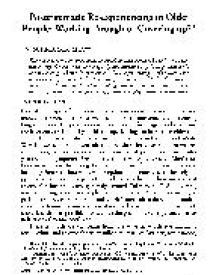Posttraumatic Re-experiencing in Older People : Working through or Covering up?
This paper is about the therapeutic approach to older people who suffer from war trauma experienced at an earlier age. Special attention is paid to posttraumatic re-experiencing and its role in treatment. First, a few examples of posttraumatic re-experiencing are described. These examples will be used to briefly illustrate some interpretation models, before devoting particular attention to one of them: the psychodynamic interpretation model. Then principles of therapy are discussed.
Posttraumatic re-experiencing is a key symptom of earlier psychotraumatic experiences. It is important to establish whether we are dealing with nightmares or re-enactments. Posttraumatic nightmares are an expression of intrapsychic concerns and conflicts and, in and of themselves, need not impede exploratory psychotherapy. The nightmare entails both regression to the perceptual level of a small child and reactivation of early childhood anxieties. Before it is possible to work through the psychotraumatic experiences, it is necessary to contextualize the early childhood anxieties that are so closely related to the themes and anxieties of later life. If this is not possible, it will have to be decided to resort to therapy that rather covers up the experience and explores the current significance of the posttraumatic complaints. Posttraumatic re-enactments have an isolated position in the representational world and are accompanied by hyperarousal and intense vegetative symptoms, which is why they are considered an impediment to exploratory psychotherapy. Posttraumatic re-nactments require treatment of the symptoms before subsequent exploratory psychotherapy can be considered.
In: American Journal of Psychotherapy ; ISSN: 0002-9564 | 50 | 2 | 231-242
http://dx.doi.org/10.1176/appi.psychotherapy.1996.50.2.231
Open Access


